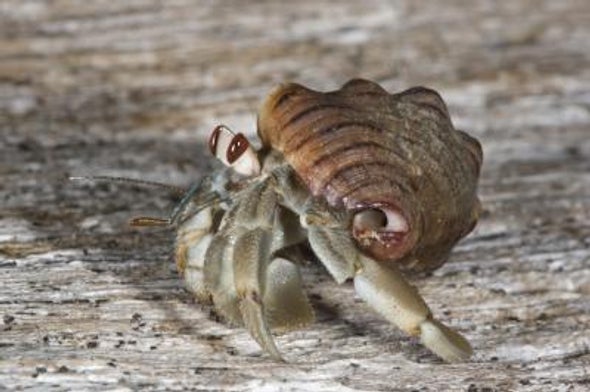(单词翻译:单击)
听力文本
This is Scientific American's 60-second Science。 I'm Karen Hopkin.
"So, I never really thought I'd study penis size, but I sorta stumbled on this topic." Mark Laidre, a biologist at Dartmouth College. Laidre travels to Costa Rica to study hermit crabs, a species called Coenobita compressus. These land crabs do some interior remodeling of their adopted shells: they extensively hollow them out, removing struts called spiral columella, to give themselves some extra elbow room. The renovation renders the shells more precious to their owners—and to other covetous crustaceans as well.
"These more valuable shells, though, are also more easily stolen, since without the spiral columella inside the shell to grip onto, individuals are pretty liable to have their property snatched from them. Particularly when they are engaged in other activities, like copulation, which requires coming partway out of the shell."
Despite his work in the field, it wasn't until Laidre was wandering through a museum that he noticed something about his favorite crabs.
"The really striking thing was that Coenobita compressus, the one whose social behavior I'd been studying for so many years, had an unusually large penis. In fact, bigger than any of the other species."

The observation gave him an idea, which he dubbed the "private parts for private property" hypothesis.
"In essence, the hypothesis posits that enlarged private parts can be an adaptation, extending a male's sexual reach and thus enabling both him and his partner to remain safely tucked away inside their shells while they copulate, thereby protecting the private property of their shells from being stolen during sex."
Darwin proposed a similar idea to explain why barnacles, which are stuck in one place, are so amply endowed.
To test his "private parts for private property" hypothesis, Laidre sized up more than 300 male museum specimens, including hermit crabs that live on land and at sea. And he found that crabs that carried custom coverings had the most impressive carnal equipment. At the same time, species that got their shells off-the-shelf had bigger gear than did crabs that walked around with no shell at all. His results are revealed in the Royal Society journal Open Science.
"It's intriguing to think that this hypothesis might have greater generality beyond hermit crabs."
But like a hermit crab encountering a humdrum shell, Laidre says he's gonna leave that one alone.
"For me, I'm much more curious about how forms of animal architecture and remodeling in the environment impact social behavior."
Thanks for listening for Scientific American — 60-Second Science. I'm Karen Hopkin.
参考译文
这里是科学美国人——60秒科学。我是凯伦·霍普金。
“我从来没有想过我会研究阴茎的尺寸,我是偶然遇到这个研究题目的。”达特茅斯学院的生物学家马克·莱德瑞说到。莱德瑞前往哥斯达黎加研究寄居蟹,这是一种学名为Coenobita compressus的物种。这些陆地蟹的确对寄居螺壳内部进行了一些改造:它们基本上将螺壳掏空,去掉其中被称为“螺旋柱”的小柱子,以便为自己腾出额外的活动空间。这种改造让寄居蟹更加珍惜自己的螺壳,而其它贪婪的甲壳类动物也会垂涎这样的螺壳。
“不过,这些更具价值的螺壳也更容易被盗,因为螺壳里可抓住的螺旋柱没有了,所以寄居蟹的‘房产’很容易被抢走。尤其是当它们忙于其他活动时,比如交配,这需要它们的部分身体从壳里出来。”
尽管这是他所研究的领域,但直到莱德瑞在博物馆闲逛时,他才注意到他最喜欢的蟹类的一些特点。
“真正令我惊讶的是,我研究寄居蟹的社交行为这么多年,才知道它们有着异常大的阴茎。事实上,它们的阴茎比任何其他蟹类物种都要大。”
那次观察使他产生了一个想法,他称之为“私产的私处”假说。
“从本质上说,这一假说假定增大的私处可能是一种适应性产物,其延伸了雄蟹的性接触范围,继而使雄蟹和伴侣在交配时,双方的身体都能安全地躲在各自的螺壳中,从而保护它们的螺壳在性交时不被盗走。”
达尔文提出过一个类似的想法,来解释为何固着在一个地方的藤壶会有那么多后代。
为了验证“私产的私处”假说,莱德瑞测量了300多只博物馆雄蟹的阴茎尺寸,包括生活在陆地和海洋上的寄居蟹。他发现,有“定制房屋”的寄居蟹拥有尺寸最大的阴茎。同时,生活在普通房屋的寄居蟹,其拥有的性器官比无房可住的寄居蟹要大。他的研究结果发表在《英国皇家学会·开放科学》期刊上。
“这个假说的适用范围可能更具普遍性,远远不只寄居蟹,这相当有趣。”
但是就像遇到无趣螺壳的寄居蟹一样,莱德瑞说他打算把这个研究题目放在一边。
“对我来说,我更感兴趣的是动物建筑风格和环境改造会如何影响社交行为。”
谢谢大家收听科学美国人——60秒科学。我是凯伦·霍普金。
译文为可可英语翻译,未经授权请勿转载!
重点讲解
重点讲解:
1. stumble on 意外发现;偶然看见;
History relates that they stumbled on a magnificent waterfall.
历史上记载他们曾意外地发现了一处壮观的瀑布。
2. hollow out 挖空(某物);挖出(孔、洞);
Hollow out the cake and fill it with cream.
在蛋糕上挖个洞,填入奶油。
3. tuck away 把…隐藏;把…隐匿;
We were tucked away in a secluded corner of the room.
我们安全地藏在房间一个隐蔽的角落里。
4. size up 打量;估计;判断;评估;
He sized up the situation very quickly.
他很快对形势作出了判断。


